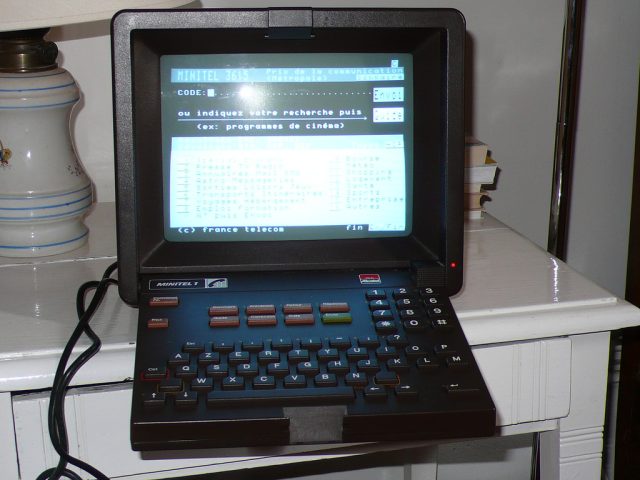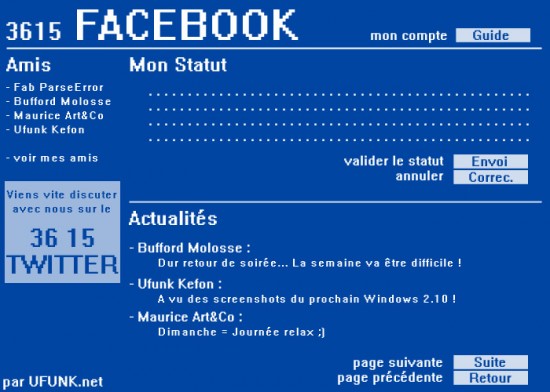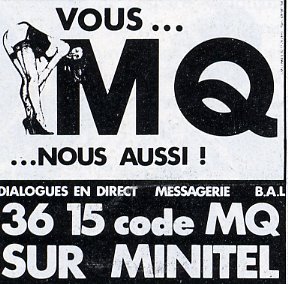
When I was in high school in the mid-1990s, I got to spend a few weeks with my French extended family at their country house east of Paris. Nearly each night, I watched my uncle stare into a small, old, dusty computer to monitor the results of the Tour de France. The little beige box had a fold-down keyboard and a pretty old-school text-only interface, even by mid-'90s standards. This was a Minitel.
The Minitel, I learned later, was France’s proto-Web computer. It dates back to 1978, well before the Web was invented just over the French border in Switzerland (and even longer before it became commercially available). The former French telco monopoly gave away the hardware for free, but charged for each individual call to various lines—analogous to websites.
But on Saturday, June 30, 2012, France Telecom will finally pull the plug on the hundreds of thousands of users that are left after over three decades of service—a demise announced about a year ago. At its peak in the mid-1990s, the Minitel had 25 million users.
“Eventually, you have to stop a service that doesn’t have any more users, and also, all of its services are available on the Internet,” wrote Phillippe Nieuwbourg, the director of the Musée Informatique, the French computer history museum. Nieuwbourg continued in a French language e-mail sent to Ars on Wednesday:
“France Telecom has pushed back [the end date] several times, but the Minitel has a lot of levels (Transpac, X25, Videotex services, servers). The maintenance costs of everything have become unreasonable relative to its uses.”

Per-minute usage long before unlimited broadband
Rather than URLs, Minitels worked by dialing into specific sites that charged per minute. There were sites allowing users to check sports scores (like my uncle), to buy train tickets, to check weather, and to visit any number of other sites—including adult chat and other semi-pornographic (as pornographic you could get on a 1980s/1990s-era text-only terminal) sites. Just as the most common domain suffix remains .com, Minitel addresses often began with 3615.
While the Minitel is little-known outside of France and francophone Europe, the geek crowd inside l’hexagone is getting together in Paris on Friday evening, local time, to fête this proud little machine. Those who are unable to attend in person have been able to celebrate on Tumblr and Twitter. Some have even re-imagined their favorite modern sites, like Twitter and Facebook, as how they could have been on a Minitel.
“Curiously, it was its main function, the electronic directory, that remains in my memory,” Nieuwbourg added.
“I was a teenager and I thought I was in love. I’d met someone while on vacation in the mountains, but I didn’t have her address. At that time, we weren’t Facebook friends! I’m speaking of a time when the Web didn’t exist. I only knew her family name, her first name, Claire, and the city where she lived. Because of the Minitel, I could find her parents’ address and no doubt write her a passionate letter. I remember the Minitel, but not the letter!”
On Thursday, one male French tech journalist even penned a remembrance article called: “I was a cyber call girl on pink Minitel,” (Google Translate) using the common French phrase (“Minitel rose”) for the Minitel’s red-light district.
“I had four or five Minitels in front of me in order to conduct as many ‘chats’ simultaneously. I had a Minitel scenario dedicated to naughty, or general messages I sent to all users (who thought, for most, that I was chatting with them in private), and I used the four other Minitels to have individualized conversations, especially for those who felt they weren’t talking just to a chat girl, or robots,” wrote Jean-Marc Manach.

Hundreds of thousands of users to be disconnected
Although the Minitel has had a declining user base over the last decade, it surprisingly still makes money for France Telecom. The company reported that in 2010, the scrappy terminals brought in €30 million (Google Translate), or $37 million, in revenue, down from a peak of around €1 billion in the mid-1990s. Today, there’s an estimated user base of around 600,000 still around, with many in the northwestern region of Brittany, where the Minitel first debuted in the late 1970s.
“Computers are all right, too, but it’s not the same,” said Yves Denais, 47, in an interview with the New York Times earlier this week. The Breton raises 165 dairy cattle on 300 rolling acres there, just west of Rennes, the regional capital.
“I’m not very ‘Internet,’” Denais added, praising the Minitel service and both the hardware’s reliability and longevity.
What France Telecom made up for in longevity, it lacked in vision and commercial viability. The former monopoly had plans to expand the Minitel to other countries, most notably the United Kingdom and Ireland. Eventually, and ideally, the company hoped to bring Minitel to the United States.
"I remember when I joined in 1990, it all felt extremely funky. My friends were all very impressed that I was bringing in this new sexy piece of French kit," said Gary Jermyn, the finance director for the Minitel’s pilot project in Ireland, in an interview this week with the BBC.
"But there were so many problems. First of all, unlike in France, we were selling the terminals, not giving them away. That was a huge handicap. And then the Internet was arriving, and that was the death knell.”
As many have pointed out, France Telecom was notoriously slow to adapt to the broader Internet and the Web itself, which rose precipitously in the 1990s in western Europe, North America, and around the globe.
Fear of return to Minitel model?
“Today, the Minitel is still used mainly by elderly people who don’t have access to the Internet,” wrote Jérémie Zimmerman, head of the French digital rights group La Quadrature du Net, in a French-language instant message to Ars on Thursday. “The Minitel was innovative for about 20 minutes, and died due to where it failed: by its centralization that never allowed it to evolve technologically: because it was under the control of France Telecom, for whom that control translated into huge profits.”
“It is true that the Minitel taught French people how to use a keyboard and how to connect to online services,” he added. “But it taught them the opposite of what is the most important lesson about the Internet: its universality, and the decentralized character of its architecture.”
Zimmerman now worries that legislative efforts to restrict the Internet will be similar to a “return to the Minitel”—in other words, a walled garden where many Internet users don’t stray beyond sites like Google or Facebook.
reader comments
44